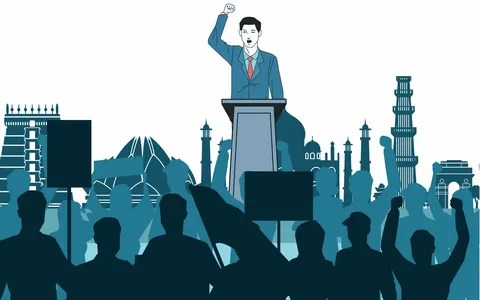20 Times Political Leaders Leveraged Fear to Drive Massive Social Change
Fear has long been a powerful tool in the arsenal of political leaders. It can rally populations, instill unity, or push through sweeping reforms.

1. The Red Scare and McCarthyism in the United States
In the 1940s and 1950s, Senator Joseph McCarthy stoked fears of communist infiltration in the U.S., leading to a period of intense political persecution. The fear of communism enabled the government to implement sweeping security measures, while individuals faced scrutiny, blacklisting, and imprisonment.
2. Nazi Germany’s Anti-Semitic Propaganda
Adolf Hitler’s regime used fear of Jewish communities as scapegoats for Germany’s economic struggles. This fear-mongering led to widespread support for discriminatory policies, culminating in the Holocaust and reshaping global perspectives on human rights.
3. The Cold War’s Nuclear Anxiety
Both the U.S. and the Soviet Union fueled fear of nuclear annihilation to justify arms races, military spending, and policies that shaped international relations for decades.
4. Post-9/11 War on Terror
Following the September 11 attacks, U.S. leaders amplified fears of terrorism, leading to the PATRIOT Act, heightened airport security, and wars in Iraq and Afghanistan. The fear-driven policies drastically altered global security protocols.
5. The Great Depression and New Deal Policies
President Franklin D. Roosevelt leveraged fears of economic collapse to push for the New Deal, which redefined the role of government in economic management and welfare programs.
6. Anti-Immigration Sentiments in the 21st Century
In recent years, leaders in countries like the U.S., U.K., and Hungary have leveraged fears of immigration to pass stricter border controls and nationalist policies, reshaping immigration systems and societal attitudes.
7. China’s Cultural Revolution
Chairman Mao Zedong instilled fear of “counter-revolutionaries” to justify sweeping purges and social reforms. This period fundamentally transformed China’s political, cultural, and economic landscape.
8. Fear of Economic Collapse During the 2008 Financial Crisis
World leaders used the fear of economic disaster to justify bailouts for financial institutions, introduce austerity measures, and implement policies that reshaped global economies.
9. Fear of Climate Change in Modern Politics
Leaders globally, such as Greta Thunberg’s influence on policy advocacy, have harnessed fears of environmental collapse to drive significant discussions and actions on sustainability.
10. The War on Drugs
Since the 1970s, political leaders have used the fear of drug addiction and crime to enforce harsh penalties, build the prison-industrial complex, and militarize law enforcement in countries like the U.S.
11. South Africa’s Apartheid System
The apartheid regime used fear of racial integration to sustain discriminatory policies, shaping decades of social inequality.
12. The Indian Partition of 1947
Leaders leveraged communal fears between Hindus and Muslims to justify partition, leading to one of the largest migrations in human history and lasting political tensions.
13. The COVID-19 Pandemic
Fear of the virus drove governments to implement unprecedented lockdowns, vaccine mandates, and public health campaigns, reshaping economies and social behaviors worldwide.
14. Fear of Socialism in Latin America
In countries like Venezuela and Chile, political leaders amplified fears of socialism to gain support for policies that favored privatization and free markets.
15. The French Revolution’s Reign of Terror
Leaders like Robespierre used fear of monarchy and counter-revolutionaries to justify mass executions and radical reforms that fundamentally changed French society.
16. The Rise of ISIS and Global Responses
Fears of ISIS and extremism prompted international coalitions to engage in military interventions and reshaped anti-terrorism strategies worldwide.
17. Fear of Technology and Job Displacement
Political discussions around automation and AI often leverage fears of job loss to advocate for universal basic income and workforce reskilling initiatives.
18. Brexit and National Sovereignty
Pro-Brexit leaders used fears of EU overreach and immigration to rally support for the UK’s withdrawal from the European Union, profoundly impacting international relations.
19. Fear of Public Health Crises in the Early 20th Century
During the Spanish Flu pandemic, governments used fear to enforce quarantines and public health measures, setting precedents for modern disease management.
20. Fear of Surveillance and Privacy Erosion
In the wake of Edward Snowden’s revelations, governments leveraged fear of terrorism to justify surveillance programs, sparking global debates on privacy rights.
Conclusion
Fear remains a potent tool in the hands of political leaders. While it can drive unity and catalyze positive change, it often comes with significant ethical considerations and long-term repercussions. Understanding these historical examples enables us to discern when fear is being leveraged constructively or manipulatively, empowering us to engage more critically with political narratives.
What's Your Reaction?



















